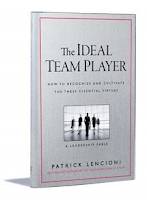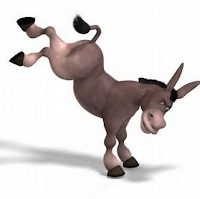Team Player

Twenty years ago, in Washington’s National Airport, I stopped to buy a book – The Five Temptations of a CEO, written by Patrick Lencioni – when commuting to Charlotte, NC where I lived with my family. It was a curious purchase. A young executive at the time, I had more ambition than skill and more energy than experience. Yet, I thought it was worth the $20 to get some insights into the challenges of being a CEO.
 Twenty years later, when travelling from Los Angeles to Nashville, I needed something to read on the long trip home. While in Hudson’s airport store, picking up my usual peanut M&M’s and Diet Coke, I noticed another book by Mr. Lencioni – the Ideal Team Player.
Twenty years later, when travelling from Los Angeles to Nashville, I needed something to read on the long trip home. While in Hudson’s airport store, picking up my usual peanut M&M’s and Diet Coke, I noticed another book by Mr. Lencioni – the Ideal Team Player.
The title caught my interest because, now as an actual CEO with a little more experience and the battle scars to prove it, I was finding that as our team at the National Museum of African American Music grew, the concept of teamwork was becoming more important and more of a challenge. So, Lencioni and I were reunited two decades later in another airport. Once again, I was eager to learn – this time with context for the subject and a need to glean what I could for the benefit of our company.
 As I boarded the flight, my expectation was that I would read a few pages and then put the book down in favor of an in-flight nap to pass the time. Little did I know that The Ideal Team Player would render me fully alert. By the time the plane landed in Las Vegas for a short layover, I’d read about 75 of the books 200 pages.
As I boarded the flight, my expectation was that I would read a few pages and then put the book down in favor of an in-flight nap to pass the time. Little did I know that The Ideal Team Player would render me fully alert. By the time the plane landed in Las Vegas for a short layover, I’d read about 75 of the books 200 pages.
Lencioni was talking to me! He must’ve been sitting in my team meetings because clearly this book had been written about my colleagues and me. The picture was so clear that I knew what I needed to do: take notes and take action. In short, Lencioni brought home for me that the ideal player on our little team would be humble, hungry and smart; and definitely not be a jackass.
From the book I was reminded that the most important of these virtues is Humility. People who exhibit humility are quick to point out the contributions of others, to share credit, emphasize the team and to define success collectively.
Those who lack humility can be especially challenging to deal with when they are key performers on the team. Their contribution is important, but likely not more important than the contributions of the rest of the team.
People who are Hungry are always looking for more – more to do, more responsibility or more to learn. They don’t want to be perceived as slackers.
But this isn’t always good. Work can become too consuming, or the hunger can become disruptive to the rest of the team.
Smart does not refer to the intellect or skill to do a job; rather, it refers to perceptiveness about the people around them or with whom they work. Smart people, in this context, are very perceptive about group dynamics.The combination of all of these virtues makes for The Ideal Team Player. A deficit in one or more of these virtues can cause a member of the team to be considered… a Jackass, and teamwork becomes more difficult.
I was observing each of these virtues in my teammates and noticed some deficiencies too. So much so that I saw the Team Player model as one to adopt as I began to work on teamwork and productivity challenges within our business.Yet, this was just the beginning. There was more reading, thinking, training and planning to do.
